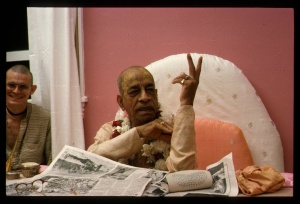SB 1.19.12 (1965): Difference between revisions
(Created page with "<div style="float:left">link=SB (1965) Nineteenth Chapter - Appearance of Sukadeva Goswami '''[[SB (1965) Nineteenth Chapter - Appearance of Sukadeva ...") |
(Vanibot #0020: VersionCompareLinker - added a link to the Version Compare feature) |
||
| Line 1: | Line 1: | ||
[[Category:Srimad-Bhagavatam (1962-1965) - Canto 01 Chapter 19]] | |||
<div style="float:left">[[File:Go-previous.png|link=SB (1965) Nineteenth Chapter - Appearance of Sukadeva Goswami]] '''[[SB (1965) Nineteenth Chapter - Appearance of Sukadeva Goswami]]'''</div> | <div style="float:left">[[File:Go-previous.png|link=SB (1965) Nineteenth Chapter - Appearance of Sukadeva Goswami]] '''[[SB (1965) Nineteenth Chapter - Appearance of Sukadeva Goswami]]'''</div> | ||
<div style="float:right">[[File:Go-previous.png|link=SB 1.19.11 (1965)]] '''[[SB 1.19.11 (1965)]] - [[SB 1.19.13 (1965)]]''' [[File:Go-next.png|link=SB 1.19.13 (1965)]]</div> | <div style="float:right">[[File:Go-previous.png|link=SB 1.19.11 (1965)]] '''[[SB 1.19.11 (1965)]] - [[SB 1.19.13 (1965)]]''' [[File:Go-next.png|link=SB 1.19.13 (1965)]]</div> | ||
{{CompareVersions|SB|1.19.12|SB 1965|SB 1972-77}} | |||
{{RandomImage}} | {{RandomImage}} | ||
| Line 6: | Line 8: | ||
==== TEXT No. 12 ==== | ==== TEXT No. 12 ==== | ||
<div | <div class="SB65verse"> | ||
Sukha upavistesu atha tesu bhuyah | |||
Kritapranamah swa chikirsitam yat. | |||
Vijnapayamasa viviktacheta | |||
Upasthito agre abhigrihita panih. | |||
</div> | </div> | ||
| Line 16: | Line 18: | ||
==== ENGLISH SYNONYMS ==== | ==== ENGLISH SYNONYMS ==== | ||
<div | <div class="synonyms"> | ||
Sukha—happily, Upavistesu—all sitting down, Atha—thereupon, Tesu—unto them (the visitors), Bhuyah—again, Kritapranamah—having offered obeisances, Swa—his won, Chikirsitam—decision of fasting, Vijnapayamasa—submitted, Viviktacheta—one whose mind is detached from worldly affairs, Upasthito—being present, Agre-in front of them, Abhigrihita panih—humbly with folded hands. | Sukha—happily, Upavistesu—all sitting down, Atha—thereupon, Tesu—unto them (the visitors), Bhuyah—again, Kritapranamah—having offered obeisances, Swa—his won, Chikirsitam—decision of fasting, Vijnapayamasa—submitted, Viviktacheta—one whose mind is detached from worldly affairs, Upasthito—being present, Agre-in front of them, Abhigrihita panih—humbly with folded hands. | ||
</div> | </div> | ||
| Line 23: | Line 25: | ||
==== TRANSLATION ==== | ==== TRANSLATION ==== | ||
<div | <div class="translation"> | ||
Thereafter all the Rishis and others having taken their seats comfortably the king expressed himself about his decision to fast until death standing before them humbly with folded hands. | Thereafter all the Rishis and others having taken their seats comfortably the king expressed himself about his decision to fast until death standing before them humbly with folded hands. | ||
</div> | </div> | ||
| Line 30: | Line 32: | ||
==== PURPORT ==== | ==== PURPORT ==== | ||
<div | <div class="purport"> | ||
Although the king had already decided to fast until death on the bank of the Ganges still he humbly expressed his decision to elicit opinions of the great authorities present there. Any decision however important and fixed up may be confirmed by some authority and that makes the thing very perfect. This means the monarchs who ruled over the earth in those days were not irresponsible dictators but they scrupulously followed the authoritative decisions of the saints and sages in terms of Vedic injunction. Maharaj Parikshit as a perfect king and he followed the principles of consulting the authority even up to the last days of his life. | Although the king had already decided to fast until death on the bank of the Ganges still he humbly expressed his decision to elicit opinions of the great authorities present there. Any decision however important and fixed up may be confirmed by some authority and that makes the thing very perfect. This means the monarchs who ruled over the earth in those days were not irresponsible dictators but they scrupulously followed the authoritative decisions of the saints and sages in terms of Vedic injunction. Maharaj Parikshit as a perfect king and he followed the principles of consulting the authority even up to the last days of his life. | ||
</div> | </div> | ||
| Line 38: | Line 40: | ||
<div style="float:right">[[File:Go-previous.png|link=SB 1.19.11 (1965)]] '''[[SB 1.19.11 (1965)]] - [[SB 1.19.13 (1965)]]''' [[File:Go-next.png|link=SB 1.19.13 (1965)]]</div> | <div style="float:right">[[File:Go-previous.png|link=SB 1.19.11 (1965)]] '''[[SB 1.19.11 (1965)]] - [[SB 1.19.13 (1965)]]''' [[File:Go-next.png|link=SB 1.19.13 (1965)]]</div> | ||
__NOTOC__ | __NOTOC__ | ||
__NOEDITSECTION__ | |||
Latest revision as of 10:28, 25 May 2020

A.C. Bhaktivedanta Swami Prabhupada
TEXT No. 12
Sukha upavistesu atha tesu bhuyah Kritapranamah swa chikirsitam yat. Vijnapayamasa viviktacheta Upasthito agre abhigrihita panih.
ENGLISH SYNONYMS
Sukha—happily, Upavistesu—all sitting down, Atha—thereupon, Tesu—unto them (the visitors), Bhuyah—again, Kritapranamah—having offered obeisances, Swa—his won, Chikirsitam—decision of fasting, Vijnapayamasa—submitted, Viviktacheta—one whose mind is detached from worldly affairs, Upasthito—being present, Agre-in front of them, Abhigrihita panih—humbly with folded hands.
TRANSLATION
Thereafter all the Rishis and others having taken their seats comfortably the king expressed himself about his decision to fast until death standing before them humbly with folded hands.
PURPORT
Although the king had already decided to fast until death on the bank of the Ganges still he humbly expressed his decision to elicit opinions of the great authorities present there. Any decision however important and fixed up may be confirmed by some authority and that makes the thing very perfect. This means the monarchs who ruled over the earth in those days were not irresponsible dictators but they scrupulously followed the authoritative decisions of the saints and sages in terms of Vedic injunction. Maharaj Parikshit as a perfect king and he followed the principles of consulting the authority even up to the last days of his life.